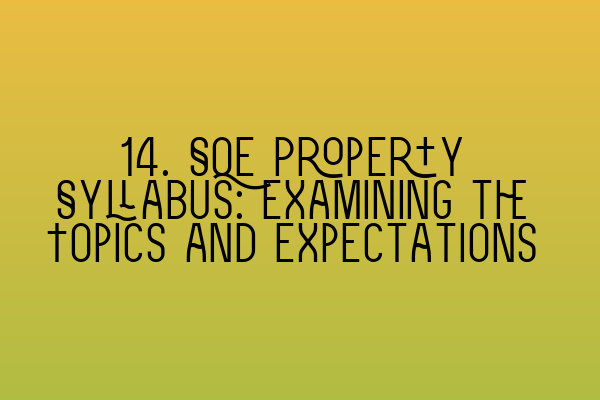SQE Property Syllabus: Examining the Topics and Expectations
If you are preparing to become a qualified solicitor, it is essential to familiarize yourself with the Solicitors Qualifying Examination (SQE) and its syllabus. The SQE is divided into two stages, with the first stage (SQE 1) covering the functional legal knowledge and the second stage (SQE 2) focusing on practical legal skills.
In this article, we will specifically examine the SQE Property syllabus, which falls under the Land Law section of the examination. We will explore the topics and expectations you need to be aware of to ace this portion of the SQE.
SQE Property Syllabus: Overview
The SQE Property syllabus encompasses a range of important concepts and principles related to property law. It is crucial to develop a comprehensive understanding of the subject matter to successfully navigate the examination.
Here are the key topics covered in the SQE Property syllabus:
1. Land Registration
One of the fundamental aspects of property law is land registration. This topic explores the legal requirements and procedures for registering land and interests in land. It covers the Land Registration Act 2002 and the Land Charges Act 1972, among other legislation.
Understanding the principles of land registration is crucial for any aspiring solicitor, as it forms the basis for determining land ownership and legal rights associated with land.
2. Co-Ownership
Co-ownership is another central topic within property law. It delves into the legal principles and implications of jointly owning land or property with another person or entity.
This area of study covers various forms of co-ownership, such as joint tenancy and tenancy in common. It also explores the rights, duties, and remedies available to co-owners.
3. Leases
Leases are an integral part of property law and involve the grant of exclusive possession of land or property for a specified period. Understanding the essential elements of a lease, its creation, interpretation, and termination, is essential for a property law solicitor.
The SQE Property syllabus will likely examine your knowledge of different types of leases, such as fixed-term leases, periodic leases, and leases with break clauses.
4. Easements
An easement is a legal right that allows one party to use another party’s land for a specific purpose. It is crucial to comprehend the nature and scope of easements, as well as the legal requirements for their creation and enforcement.
Topics related to easements may cover rights of way, rights of light, and other types of implied or express easements.
5. Mortgages
Mortgages play a significant role in property transactions, particularly in relation to financing the purchase of property. Understanding the legal principles surrounding mortgages, including their creation, enforcement, and discharge, is essential for a property law solicitor.
The SQE Property syllabus may explore topics such as different types of mortgages, remedies available to mortgagees and mortgagors, and the impact of foreclosure or repossession.
6. Trusts of Land
Trusts of Land refers to situations where land is held in trust for specific beneficiaries. This topic encompasses the legal principles governing trusts, co-ownership in a trust context, and the rights and duties of trustees and beneficiaries.
An in-depth understanding of trusts of land is crucial for solicitors involved in property transactions involving trust arrangements or disputes.
Expectations for the SQE Property Examination
As the SQE Property syllabus covers a broad range of topics, it is vital to ensure you are adequately prepared for the examination. Here are a few tips to help you succeed:
1. Study the Law and Relevant Legislation
Invest time in studying the relevant property law principles, as well as the legislation that underpins them. Familiarize yourself with statutes such as the Land Registration Act 2002, Law of Property Act 1925, and Trusts of Land and Appointment of Trustees Act 1996.
2. Practice Exam Questions
To gauge your understanding and prepare effectively, practice answering SQE Property exam questions. There are numerous SQE 1 practice exams available that can provide valuable insights into question formats and assessment criteria.
Check out these related articles for SQE 1 practice exam questions and practice mock exams:
3. Take Preparation Courses
Consider enrolling in SQE 1 and SQE 2 preparation courses that specifically focus on property law. These courses provide structured guidance, study materials, and expert insights to enhance your understanding and exam performance.
Explore these resources for SQE preparation courses:
4. Stay Updated with SRA SQE Exam Dates
Keep track of the SRA SQE exam dates to ensure you can plan your preparation and revision effectively. Knowing the examination schedule in advance allows you to allocate sufficient time for each section of the SQE.
Check out the latest SRA SQE exam dates on our website:
By following these tips and dedicating ample time to studying, practicing, and preparing, you can confidently approach the SQE Property examination and excel in this important aspect of the qualification process.
Remember, property law plays a significant role in legal practice, and a solid foundation in this area will benefit you throughout your career as a solicitor.
